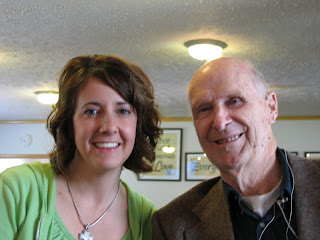The first time Campbell left his house after this event, he stopped at the end of his driveway and looked back to two pairs of eyes peeping out of the window.
In Noel’s mind, they were wondering if he would leave them too, as their mother had. Heartbroken, Campbell heard the “still, quiet voice of the Lord” saying “If you let me, we will raise these children.” Campbell, now 82, says it was his joy.

Sonia Coombs and Noel Campbell
“If we follow Jesus, we’ll be leaving a legacy our children will want to follow,” he said.
Luke 18:15-17 says, “People were also bringing babies to Jesus to have him touch them. When the disciples saw this, they rebuked them. 16But Jesus called the children to him and said, ‘Let the little children come to me, and do not hinder them, for the kingdom of God belongs to such as these. 17I tell you the truth, anyone who will not receive the kingdom of God like a little child will never enter it.’”
Campbell says that we are either leading children to Him or sending them away.
He said we must have a legacy of
• A love of God that’s unconditional
• A faith in who Jesus is
• A trust in our Lord Jesus and his words in our every day walk of life
• A hope in our Lord God because a home in the world will never bring life.
The key, according to Campbell, is to allow the Lord to fill him with more love and less law. When this happens, children want to please their father.
Campbell quoted "Children Learn What They Live" by Dorothy Law Knolte, PhD:
“If a child lives with criticism, he learns to condemn.
If a child lives with hostility, he learns to fight.
If a child lives with ridicule, he learns to be shy.
If a child lives with shame, he learns to feel guilty.
If a child lives with tolerance, he learns to be patient.
If a child lives with encouragement, he learns confidence.
If a child lives with praise, he learns to appreciate.
If a child lives with fairness, he learns justice.
If a child lives with security, he learns to have faith.
If a child lives with approval, he learns to like himself.”
Then he added his own ending: “If a child lives with Christ, he learns to love God and man.”
Campbell quoted Proverbs 22:6, “Train a child in the way he should go, and when he is old he will not turn from it.”
He said there were many ways to lead a child to Jesus and they all seem right in our own understanding, but God’s way works. Proverbs 3:5 says, “Trust in the LORD with all your heart, and lean not on your own understanding.”
He wrapped up his message by sharing three proverbs. One was about someone who had taught a child about God by scaring him with the awesome works of God and the child’s reaction of fear and resistance when it was time to meet the Father. The second proverb was about someone so distracted by everything that must be done that when it was finally time to meet the Father, the child was distracted and unable to focus. The last proverb was about someone who followed the child’s lead and interests and not only told stories about the Father, but also listened to the child retell them as well. When it was finally time to meet the Father, the child was overjoyed, and the individual who lead the child stepped back and merely watched as a happy outsider to their relationship.
He recited Psalm 139: 23-24: “Search me, O God, and know my heart; test me and know my anxious thoughts. See if there is any offensive way in me, and lead me in the way everlasting.” In addition, Noel challenged the congregation to wake every morning and greet God with a “What would you like me to do today?” and listen for an answer from the still, small voice.

An inspiring experience, simple and well told. If I reflect on Psalm 139: 23-24 daily, I would lead a more peaceful life. Thanks be to God.
ReplyDelete